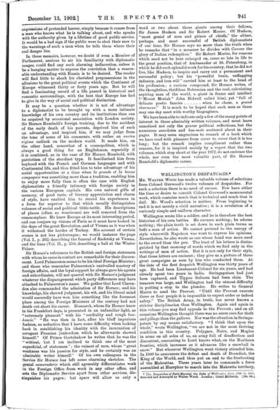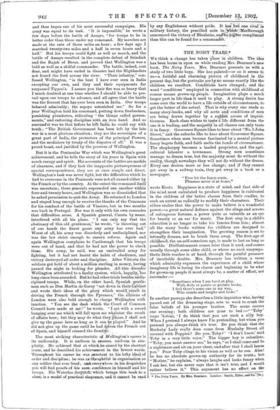WELLINGTON'S DESPATCtLES.*
MR. WALTER WOOD has made a valuable volume of selections from Colonel Gurwood's twelve volumes of despatches. . For such a selection there is no need of excuse. Few have either the time or desire to consult Colonel Gurwood's monumental work, which contains much that is technical and much that is dull. Mr. Wood's selection is neither. From beginning to end it is not merely a vivid narrative ; it is a revelation of a curiously simple and uniform character.
Wellington wrote like a soldier, and he is therefore the best historian of his own battles. He excuses nothing; he adorns nothing; the plain truth is set down in such plain terms as befit a man of action. He cannot pretend to the energy of style wherewith Napoleon was wont to express his opinions. Nevertheless, he also wrote as one whose hand was more used to the sword than the pen. The least of his letters is distin- guished by that economy of words which we find only in the writings of men of action. But it is not only for their style, that these letters are eminent ; they give us a picture of three great campaigns as seen by him who conducted them. At the date of the first despatch Wellington was thirty years of age. He had been Lieutenant-Colonel for six years, and had already spent two years in India. Seringapatam had just been captured, and Tippoo Sultann had been slain. The treasure was large, and Wellington had the utmost difficulty in putting a stop to the plunder. He writes to General Harris to send the Provost. "Until the 'Provost execute three or four people it is impossible to expect order or indeed safety." The British Army, in truth, has never known a stricter disciplinarian than Wellington. Again and again in this volume you may find appeals to the Provost ; and on all occasions Wellington thought there was no surer cure for theft and pillage than the gallows. Nor was the situation in Seringa- patara by any means satisfactory. "I think that upon the whole," wrote Wellington, "we are not in the most thriving condition in this country. Polygars, Nairs, and Moplas in arms on all sides of us, an army full of disaffection and discontent, amounting to Lord knows what, on the Northern frontier, which increases as it advances like a snowball in snow." But wherever Wellington went victory attended him. In 1800 he announces the defeat and death of Doondiah, the King of the World, and thus put an end to the freebooting of the Mahrattas. Three years later he commands a force assembled at Hnrryhur to march into the Mahratta territory,
• The Despatches of Field-Maraud the Oulu of Wellington from 1799 to 11115. Selected and Arranged by Walter Weed. Leaden ; Great BAcbezds. Lac &LI and thus began one of his most successful campaigns. His army was equal to its task. "It is impossible," he wrote a few days before the battle of Assaye, "for troops to be in better order than those under my command. My marches are made at the rate of three miles an hour ; a few days ago I marched twenty-two miles and a half in seven hours and a half." But _his troops could fight as well as march, and the battle of Assaye resulted in the complete defeat of Scindiah and the Rajah of Berar, and proved that Wellington was a bold as well as a skilful commander. The battle, indeed, cost dear, and might have ended in disaster had the Highlanders not found the ford across the river. "Their infantry," con- fessed Wellington, "is the best I have ever seen in India excepting our own, and they and their equipments far surpassed Tippoo's. I assure you their fire was so heavy that I much doubted at one time whether I should be able to pre- vail upon our troops to advance, and all agree that the battle was the fiercest that has ever been seen,in India. Our troops behaved admirably ; the sepoya astonished me." So for a year Wellington held his command, putting down freebooters, punishing plunderers, ridiculing "the things called govern- ments," and enforcing discipline.with an. iron hand. And so successful was he that before he left India he could say with truth ; " The British Government has been left by the late war in a most glorious situation ; they are the sovereigns of a great part of India, the protectors of the principal Powers, and the mediators by treaty of the disputes of all." It was a proud boaat; and justified by the prowess of Wellington.
But it is the Peninsular War which was Wellington's great achievement, and be tells the story of his years in Spain with much energy and spirit. His accounts of the battles are models of clearness, and if they lack the inapposite picturequeness of special correspondence, they are at once simple and direct. Wellington's task was never light, but the difficulties which he had to overcome in the Peninsula were not all caused either by the French or by the country. At the outset the command itaelf was uncertain; three generals, superseded one another within four-and-twenty hours, and Wellington was so dissatisfied that he asked permission to quit the Army. He returned to London and stayed long enough to receive the thanks of the Commons for his conduct of the battle of Vimiero, but in two months was back in Portugal. Nor was it only with hie own comrades that difficulties arose. A Spanish general, Cuesta by name, interfered with all his plans. "I can only say that the obstinacy of this old gentleman," he wrote, "is throwing out of our hands the finest game any army has ever had." Worst of all, his army was disorderly .and undisciplined, nor was the law strict enough to ensure reform. Again and again Wellington complains to Castlereagh that his troops were out of hand, and that he had not the power to check them. His army, he said, was an .unrivalled army for fighting, but it had not learnt the habit cif obedience, and victory destroyed all order and discipline, After Vittoria the soldiers got hold of about a xnillion sterling in money, having passed the might in looking for plunder.. All this disorder' Wellington attributed to a faulty system, which, happily,,las long since been amended. But he had othertrials besides undis- ciplined troops. While, on. the other hand, Spanialt _gentle- men such as Don Martin de Garay "eat down in their Cabinet and wrote their ideas of the glory Which would:result in driving the French through the Pyrenees," the citirens of London were also bold enough to charge Wellington with inaction. "You see the dash which the Court of Common Council have made at me !" he wrote. "I act with a sword • hanging over me which will fall upon me wh4eirer, the result of affairs here; but they may do what theyhlease, I shall not give up the game here as long as it can be played." And he did not give up the game until he had diien the French out of Spain, and himself crossed the frontAr.
The most striking characteristic of AVellington's career is its uniformity. It is uniform in esiecess, uniform in sim- plicity. He achieved that at whickhe aimed. by the shortest route, and he described his achievement in the fewest words. Throughout his career he was genstant to his lofty ideal of order and discipline ; he was aa•thoughtful in organisation as any soldier that ever lived ; and, everywhere in his despatches you will find proofs of his sure. confidence in himself. and his troops. His Waterloo zlearattilY,---which -brings--this -book to a close, is a model of practical eloquence, and it cannot be read by any Englishman without pride. It IF; 1)-ni one riVarin military history, the pencilled note in."hicir :Marlborough
announced the victory of Blenheim, an, :4e cPno compliment
– J311, .r comp
than this can be found for a commandei.



















































 Previous page
Previous page